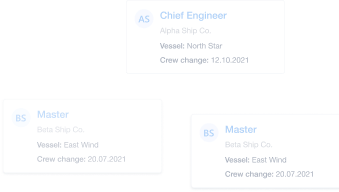These 5 Things Could Get Your CoC Suspended or Cancelled

As a professional working in a maritime job, you know that you must follow international regulations from the International Convention on Standards in Training, Certification and Watchkeeping for Seafarers (STCW) if you are working on a commercial vessel going to sea.
And you will also need a Certificate of Competency (CoC) or a Certificate of Equivalent Competency (CEC) in order to carry out certain duties as dictated by your rank and position.
A Certificate of Competency is an essential license that everyone working in a seafarer job on an ocean-bound commercial ship, whether it’s a container ship or a cruise liner, must possess as a testament to your knowledge and skills.
However, here’s the important thing to note. A CoC is not irrevocable; it can be revoked, suspended, or canceled if your behavior and/or performance is not up to scratch. The authorities may take action if they receive complaints about you or are dissatisfied with your conduct.
Now, we’re sure that no one reading this would purposefully try and get their Certificate of Competency (or Certificate of Equivalent Competency) canceled but as a reminder, it’s always good to be aware of what the grounds for cancellation or suspension are.
Read more: 8 Things You Should Never Do in Jobs at Sea
No matter how good you are at your work on a ship, it's crucial for you personally, and as a leader or Head of Department on a vessel, to be fully aware of the circumstances that can lead to the revocation or suspension of your Certificate of Competency.

As a disclaimer, please note that these five things that could lead to your CoC or CEC being canceled are not an all encompassing list and reasons for having your certificate revoked will depend upon your employer and supervising Officers or Head of Department.
However, these are five big no-nos that you should avoid at all costs if you want to continue to be a success in your seafarer job and climb your way up the maritime career ladder.
Doing these 5 things could get your CoC revoked or suspended
1. Engaging in abusive behavior
Taking part in violent acts, misbehaving with fellow crew members, or physically harassing others in a way that leads to serious injury or even death to a person, or damage to the vessel can result in the suspension or permanent revocation of a seafarer's CoC.
2. Displaying a lack of competence
It stands to reason that your Certificate of Competency may be put on hold if your lack of competence is adversely affecting your job at sea. Poor performance that results in a maritime incident that causes injury, death, or damage to the vessel WILL be addressed by your superiors.
3. Being intoxicated from drink or drugs
As someone working in a seafarer job, you know that you need to respect your vessel’s rules regarding alcohol. Maybe your employer operates a dry fleet or perhaps you’re allowed a beer after your shift or watch to unwind. But if you’re found to be under the influence of drugs or alcohol during an incident that results in a loss of life or cargo, you may well face cancellation of your CoC or CEC.
4. Engaging in misconduct or acting with negligence
Your Certificate of Competency or equivalent could be temporarily or indefinitely suspended if your misconduct while working on a ship results in harm to the vessel. This could be a collision, stranding, running aground or vessel abandonment.

5. Providing false information
Providing false or misleading information that leads to a maritime accident, incident, injury, or fatality can result in the suspension of your seafarer's CoC. This could take the form of lying about something or falsifying records or documents.
Other things to know about the suspension of a CoC
It's important to note that a CoC or CEC will only be suspended or canceled after a thorough investigation and inquiry by the relevant authorities.
The decision to revoke a Certificate of Competency or Certificate of Equivalent Competency is not one that is taken lightly and action will only be taken after the accused has been given a fair chance to respond to the allegations, typically through a formal show cause hearing.
What is a Show Cause Hearing?
A Show Cause Hearing, also known as an Order to Show Cause Hearing, is a legal proceeding where an individual or party is required to appear before a court and explain or "show cause" why a specific order, action, or decision should not be taken by the court.
This type of hearing is often used in situations where the court needs to quickly decide on a matter, such as when immediate action is required to prevent possible harm or to address an urgent issue. For example, if your CoC is to be revoked so that you cannot return to sea.
During a Show Cause Hearing, the party that has been served with the Show Cause Order must present evidence, arguments, or legal reasons to persuade the court either not to proceed with a proposed action - in this case, canceling or suspending a Certificate of Competency or equivalent.
The opposing party may also be given the opportunity to present their case, arguing why the court should proceed with the action in question.

The specific procedures and requirements for a Show Cause Hearing can vary depending on factors such as the country, the jurisdiction and the court's rules.
Can you appeal the suspension or cancelation of your CoC?
Now bear in mind that we are not legal professionals and this is a blog post written with the intent of keeping you up-to-date with the basics, so do take appropriate legal advice and do your research if you should find yourself in this situation.
Having said that, seafarers whose CoC or CEC has been revoked or suspended have the right to appeal the decision within a specified timeframe, which varies by country and jurisdiction.
As someone working on a ship and who holds down a professional seafarer job, you should honestly and consistently monitor your conduct while you’re aboard to ensure your actions or behavior, whether intentional or otherwise, do not jeopardize the safety of your vessel, the cargo or your fellow crew.
Take care out there and let’s make shipping safer, more inclusive and happier for everyone onboard.

Eve Church
Eve is Martide's content writer, publishing regular posts on everything from our maritime recruitment and crew planning software to life at sea. Eve has been writing professionally for more than two decades, crafting everything from SEO-focused blog posts and website landing pages to magazine articles and corporate whitepapers.
UK



